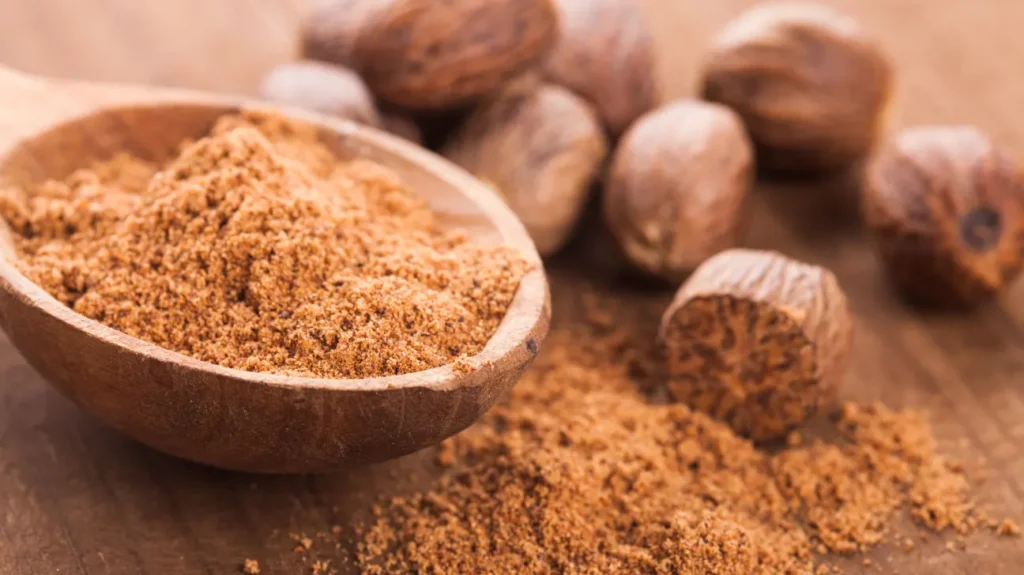Nutmeg, a spice commonly found in kitchens worldwide, is much more than just a flavoring agent for holiday recipes. Derived from the seeds of the Myristica fragrans tree, native to Indonesia, nutmeg has been prized for centuries not only for its culinary uses but also for its medicinal properties. In recent years, there has been growing interest in the potential nootropic (cognitive-enhancing) benefits of nutmeg, especially due to its active compounds that influence brain function. This article provides a comprehensive exploration of nutmeg, detailing its chemistry, physiological effects, nootropic potential, proper dosage, side effects, interactions with other supplements and drugs, and considerations for safe use.
You May Also Like:
Sources of Nutmeg
Nutmeg is derived from the seed of the Myristica fragrans tree, which produces both nutmeg and mace (the reddish outer covering of the seed). The seed is typically dried and ground into a powder, making it available as a spice. Historically, it has been used in traditional medicine for a variety of purposes, ranging from improving digestion to alleviating pain and enhancing cognitive function. Nutmeg is commonly found in culinary preparations, especially in baking, sauces, and beverages like eggnog. In addition to its culinary uses, nutmeg is also available as a dietary supplement in the form of capsules, powders, and extracts.
Promote Respiratory Wellness and Mental Clarity with Nutmeg Supplements—Shop Amazon’s Best Now!

Chemistry of Nutmeg
The active components responsible for nutmeg’s effects on the brain and body are primarily essential oils, the most notable of which are myristicin and eugenol. Myristicin, in particular, is a phenylpropene compound that is structurally similar to substances found in other psychoactive plants. It has been suggested that myristicin may contribute to nutmeg’s nootropic effects, as it is capable of crossing the blood-brain barrier and influencing neurotransmitter activity within the brain. Additionally, eugenol, another important compound found in nutmeg, is known for its anti-inflammatory, analgesic, and antioxidant properties.
Nutmeg also contains other bioactive compounds, including safrole, terpenes, and flavonoids, all of which contribute to its medicinal and possibly cognitive-enhancing properties. While these compounds are not as extensively studied as myristicin and eugenol, they are believed to contribute to nutmeg’s overall impact on health.

Physiological Mechanisms of Nutmeg in the Body and Brain
The effects of nutmeg on the body are complex and involve a range of physiological mechanisms. The most well-known compound, myristicin, is thought to be a key player in nutmeg’s nootropic potential. Myristicin is believed to exert its effects by interacting with neurotransmitter systems in the brain, particularly those involving serotonin and dopamine. These neurotransmitters play crucial roles in mood regulation, cognitive function, and emotional well-being.
Myristicin is also thought to have mild psychoactive effects, potentially affecting brain activity by stimulating the central nervous system (CNS). This stimulation may result in enhanced focus, mental clarity, and even slight euphoria in some individuals. However, the psychoactive effects of nutmeg are highly dose-dependent, with larger doses potentially leading to unpleasant side effects, including confusion and hallucinations.
Eugenol, another active compound, plays a role in reducing oxidative stress and inflammation within the brain, potentially protecting against neurodegenerative diseases. By enhancing antioxidant defenses, eugenol may help safeguard neurons from damage caused by free radicals, which are often implicated in the aging process and cognitive decline. Furthermore, eugenol’s anti-inflammatory properties may contribute to improved blood flow and cognitive performance.
Boost Immune Support and Improve Brain Performance with Nutmeg Supplements—Shop Today on Amazon!

Nootropic Benefits of Nutmeg
While nutmeg is traditionally used as a spice, its nootropic potential is an area of increasing research. Several studies have suggested that nutmeg and its active compounds can enhance cognitive function in various ways. Below are some of the primary cognitive benefits associated with nutmeg supplementation.
- Improved Cognitive Function and Focus
Nutmeg, through its active compounds, may have the ability to enhance cognitive performance, especially in areas such as attention and focus. Myristicin, by influencing neurotransmitter activity, may help improve mental clarity and concentration. Studies have shown that compounds like myristicin and eugenol can act as mild stimulants for the brain, improving overall cognitive function. This makes nutmeg an interesting supplement for individuals seeking a natural cognitive boost. - Mood Enhancement and Stress Relief
Nutmeg has been historically used to improve mood and alleviate symptoms of anxiety and depression. Its ability to influence serotonin and dopamine levels may contribute to enhanced mood regulation, which is essential for overall cognitive well-being. As a mild sedative, nutmeg may also help reduce stress and anxiety by promoting relaxation and improving sleep quality. These properties make it particularly beneficial for individuals dealing with mood disturbances or high-stress environments. - Neuroprotection and Cognitive Aging
The antioxidant properties of nutmeg, primarily attributed to eugenol, may play a significant role in protecting brain cells from oxidative stress. This can have long-term benefits for cognitive health, especially in the context of aging. Neurodegenerative diseases, such as Alzheimer’s and Parkinson’s, are characterized by the progressive loss of neurons, often exacerbated by oxidative damage. By neutralizing free radicals, nutmeg may help preserve cognitive function and delay the onset of age-related cognitive decline. - Pain Relief and Anti-inflammatory Effects
Nutmeg’s anti-inflammatory properties are beneficial not only for physical health but also for brain health. Inflammation in the brain, known as neuroinflammation, has been linked to several cognitive disorders. By reducing inflammation, nutmeg may contribute to improved cognitive performance, especially in individuals with inflammatory brain conditions or those prone to brain fog.

Dosage and Supplementation Guidelines
Nutmeg is widely available as a dietary supplement, typically in the form of powders, capsules, or extracts. However, it is crucial to note that the dosing of nutmeg should be approached with caution due to its potent active compounds. The amount of nutmeg required to experience cognitive benefits may vary depending on the individual’s body chemistry and health conditions.
- General Nootropic Dosage
For cognitive enhancement, a typical dose of nutmeg powder is around 1/4 to 1/2 teaspoon (approximately 1 to 2 grams) per day. This amount is generally sufficient to obtain the potential cognitive benefits without the risk of unpleasant side effects. However, it is essential not to exceed this dose, as higher amounts can lead to psychoactive effects and toxicity. - Extract Dosage
Nutmeg extracts, which are more concentrated, should be used sparingly. A recommended dose for extract supplements typically ranges from 300 to 500 mg per day. Always follow the manufacturer’s instructions and consult with a healthcare provider before beginning supplementation, especially when using higher-potency extracts. - Toxicity and Overdose
While nutmeg is generally safe in small amounts, consuming large quantities can be dangerous. Doses above 5 grams may cause toxic effects, including hallucinations, nausea, vomiting, and dizziness. High doses have also been associated with adverse cardiovascular effects. Therefore, it is essential to adhere to safe dosing recommendations and avoid excessive consumption.
Promote Digestive Health and Boost Mental Clarity with Nutmeg Supplements—Order Now on Amazon!

Side Effects and Safety
Nutmeg is generally safe when used in culinary quantities, but higher doses can lead to side effects. Some of the potential side effects include:
- Psychoactive Effects
Nutmeg contains myristicin, which can have psychoactive effects at high doses. Ingesting large amounts of nutmeg (5-10 grams) may lead to confusion, disorientation, hallucinations, and a sense of euphoria. These effects can be distressing and should be avoided. - Digestive Disturbances
Some individuals may experience gastrointestinal discomfort, including nausea, diarrhea, or abdominal cramps, especially when consuming larger amounts of nutmeg. These symptoms may be more pronounced in individuals with sensitive digestive systems. - Cardiovascular Effects
High doses of nutmeg can lead to an increased heart rate and elevated blood pressure. Individuals with pre-existing cardiovascular conditions should exercise caution when considering nutmeg supplementation.
Interactions with Other Supplements and Medications
Nutmeg is relatively safe in combination with most supplements, but there are some considerations for individuals taking certain medications or other nootropics.
- Sedatives and Antidepressants
Nutmeg has mild sedative effects, and combining it with other sedative medications or supplements may enhance these effects, potentially leading to excessive drowsiness or lethargy. It is recommended to avoid combining nutmeg with medications such as benzodiazepines or other CNS depressants unless under medical supervision. - Anticoagulants and Blood Thinners
Nutmeg may have mild anticoagulant effects, potentially interfering with blood-thinning medications like warfarin. Individuals taking such medications should consult with their healthcare provider before supplementing with nutmeg.
Risks for Individuals with Certain Health Conditions
While nutmeg is safe for most individuals when used responsibly, certain health conditions may require caution.
- Pregnancy
Pregnant women should avoid high doses of nutmeg, as it may stimulate uterine contractions and pose a risk of miscarriage. It is generally considered safe to use nutmeg in culinary amounts, but pregnant women should avoid excessive supplementation. - Liver and Kidney Disease
Individuals with liver or kidney disease should be cautious with nutmeg supplementation, as the body may have difficulty metabolizing high doses of the spice, leading to potential toxicity.
Enhance Cognitive Focus and Digestive Comfort with Nutmeg—Buy Now on Amazon!

Conclusion: Should You Consider Nutmeg as a Nootropic?
Nutmeg offers a promising potential as a nootropic supplement due to its unique combination of active compounds, including myristicin and eugenol, which may influence brain activity and promote cognitive health. While more research is needed to fully understand its efficacy and long-term safety, nutmeg’s antioxidant, anti-inflammatory, and mood-enhancing properties make it a valuable addition to a cognitive health regimen. As with any supplement, it is important to use nutmeg responsibly and adhere to recommended dosages to avoid potential side effects. Always consult with a healthcare provider before beginning supplementation, especially for individuals with underlying health conditions or those currently taking medications.
By incorporating nutmeg in moderation, it may serve as a natural way to boost brain function, improve focus, and support overall cognitive well-being.

References:
- Nutritional and therapeutic potential of nutmeg (Myristica fragrans): A concurrent review. Retrieved from: https://www.tandfonline.com/doi/full/10.1080/23311932.2023.2279701
- Chemistry, antioxidant and antimicrobial potential of nutmeg (Myristica fragrans Houtt). Retrieved from: https://www.sciencedirect.com/science/article/pii/S1687157X12000571
- Health Benefits of Nutmeg. Retrieved from: https://www.health.com/nutmeg-8550887
- 8 Science-Backed Benefits of Nutmeg. Retrieved from: https://www.medicinenet.com/8_science-backed_benefits_of_nutmeg/article.htm
- Can Nutmeg Really Improve Your Blood Pressure? Here’s What the Research Says. Retrieved from: https://www.verywellhealth.com/nutmeg-8656722
Important Note: The information contained in this article is for general informational purposes only, and should not be construed as health or medical advice, nor is it intended to diagnose, prevent, treat, or cure any disease or health condition. Before embarking on any diet, fitness regimen, or program of nutritional supplementation, it is advisable to consult your healthcare professional in order to determine its safety and probable efficacy in terms of your individual state of health.
Regarding Nutritional Supplements Or Other Non-Prescription Health Products: If any nutritional supplements or other non-prescription health products are mentioned in the foregoing article, any claims or statements made about them have not been evaluated by the U.S. Food and Drug Administration, and such nutritional supplements or other health products are not intended to diagnose, treat, cure, or prevent any disease.


